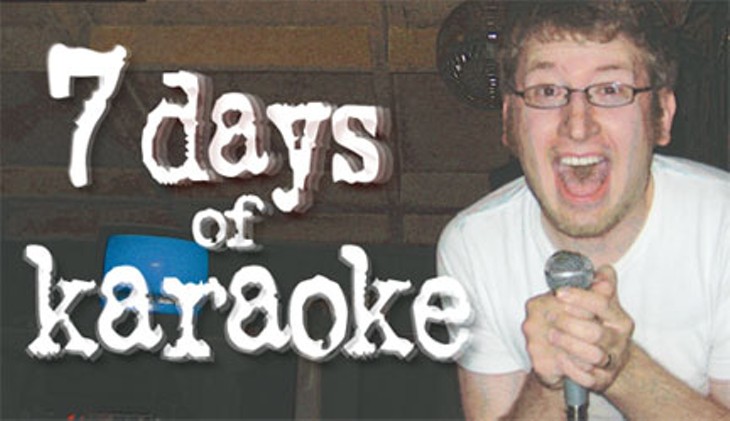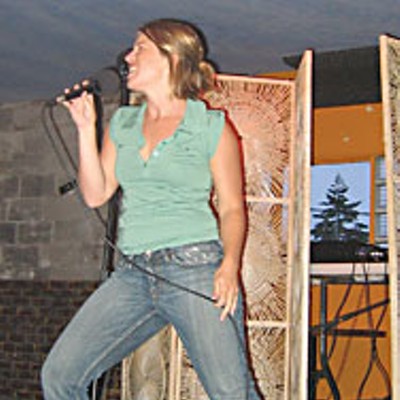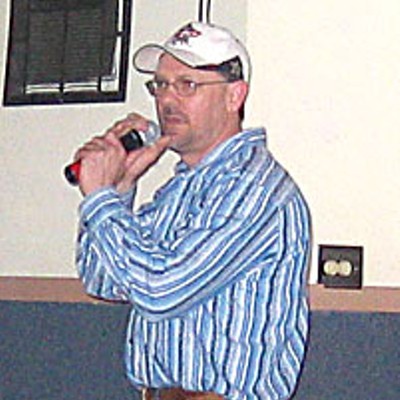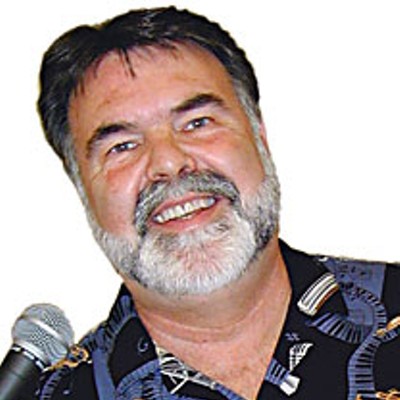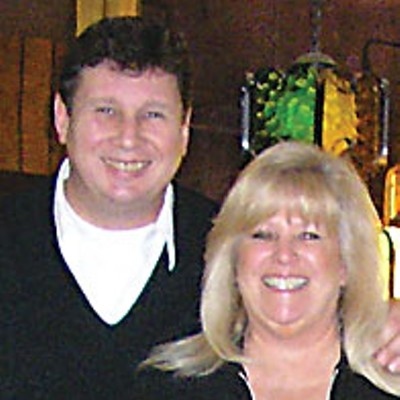[
{
"name": "Top Stories Video Pair",
"insertPoint": "7",
"component": "17087298",
"parentWrapperClass": "fdn-ads-inline-content-block",
"requiredCountToDisplay": "1"
}
]
If you’re like us, these questions plague you: What is it about karaoke — singing other people’s songs, often badly — that brings tons of people to bars every night all over the country? Who are these people, what exactly do they do and why do they do it?
And most importantly, is it physically possible to sing karaoke in the course of seven consecutive nights and live to tell the tale?
We can’t say we have all the answers, but if you’re curious, read on.
TUESDAY: CHER-AE HEIGHTS CASINO, TRINIDAD
We arrived early to Cher-Ae Heights’ Firewater Lounge for karaoke with G-Money, and although the crowd was thin there was no shortage of singers — many of whom, like Cammi Cain, are also employees at the casino. “I changed my schedule so I could go,” Cain said.
Bartenders told us that people tend to crowd in around 11 p.m., but those who really want to sing come early so they can perform as many times as possible . One regular told us G-Money has a tendency to put his friends on stage before others, especially when the bar gets busy. (The friends disagree.)
G-Money has an impressive karaoke set-up: a stellar sound system, thousands of songs to choose from, a plethora of microphones for group sing-alongs and a variety of props (read: Bon Jovi wig). Usually, karaoke hosts only have two microphones, one of which never works, and outdated song lists. G-Money, though, provides a solid singing experience, even if he isn’t the greatest singer.
Although some trained singers think they are above singing karaoke, other musicians enjoy practicing their repertoire live. Joel, a drummer, put his reservations aside and did a passionate performance of the White Stripes’ “Fell in Love with a Girl,” complete with rock and roll stance and an Elvis-like leg shake. “I was really nervous.” Joel said afterward, holding up his fingers which quivered with adrenaline tremors. “Look at my hand. It’s still shaking!” Reagan, a singer-songwriter with a crystal-clear voice, took the opportunity to break out into classic ’80s butt-rock.
A blonde woman at a neighboring table balked when asked if she and her friends were going to sing: “They are, but not me. I’m the manager.” The role of manager, she explained, involves picking out songs and pushing them on her friends, and also, making sure her companions don’t get so drunk that they fail to fulfill their singing duties. Shy people who have no interest in being the center of attention make good managers, so next time your mother refuses to participate, promote her to management.
One singer who had no interest in being a manager was Billy Skerratt. “I’ve been doing karaoke for 10 years,” he said — ever since his friend started up a karaoke business in Sacramento, right around the time Skerratt and his wife divorced. Karaoke was something Skerratt could count on as a constant in his life at the time, a venue for a group of like-minded friends with failed romances to commiserate and celebrate.
Skerrat’s song — Brooks and Dunn’s “Neon Moon” — was just like his story. “If you lose your one and only/there’s always room here for the lonely,” he sang. “Drink by drink/the words of every sad song/seem to say what I think.”
“Some people say I’m a bad singer, some say I’m a good singer,” said Skerratt. “It doesn’t matter, because I love music and I love to sing. It takes a lot of courage to get up there. I have completely mastered stage fright. Completely.”
songs Reagan: Poison, “Fallen Angel”
Joel: The White Stripes, “Fell in Love with a Girl”
WEDNESDAY: THE BOILER ROOM, EUREKA
The Boiler Room’s long interior stretches from a series of pool tables towards an elevated karaoke stage, making it feel like a garage — a garage full of bikers, cowboys, clean-cut frat types and punks. At least five of the barflies sported cowboy hats, and the rest were coated in leather or large tattoos. Surprisingly, the first biker dude to take the stage sang Dan Fogelberg’s easy-listening “Same Old Lang Syne,” which kind of put us at ease, but the vibe was somehow less friendly and encouraging than the night before had been.
Heavy drinking seemed to be a higher priority than singing — take at least one screeched version of Evanescence’s “Bring Me to Life” as proof — but it’s hard to sum up the general milieu at this karaoke night, if there is one. It was all over the place. Both bartenders sang songs at opposite ends of the karaoke spectrum — Gina, with a sprightly version of Young MC’s “Bust a Move,” and Shay, expertly yowling Danzig’s “Mother.” Emma Brecain sang Madonna’s disturbingly straightforward “Hanky Panky,” and we heard another version of “Neon Moon.” (This happened most nights.)
Chris Clay — the kind of guy you call by his first and last names — runs a tight ship. Next to the stage, he keeps a box containing alphabetically organized files of past singers’ names and their song choice histories. He plays a different piece of background music between songs and announces singers like a DJ on Hot 97. And he sings a mean “Billie Jean.”
Reagan’s pitch-perfect version of “Perfect Love” earned her a huge round of applause, but Joel’s attempt to get the crowd to “shake it like a Polaroid picture” during “Hey Ya” was met with a tepid response. Advice: don’t expect the undivided attention of the crowd when you take a hold of the mic, because half of the people there only want to practice their corner shot.
songs Reagan: Trisha Yearwood, “Perfect Love”
Joel: Outkast, “Hey Ya”
THURSDAY: BLUE LAKE CASINO, BLUE LAKE
At 8:30 p.m., almost every table in this candlelit lounge was taken. Barely had the words “I’m doing a story on karaoke,” left Reagan’s mouth before one Blue Lake regular, Shannon Hogan, sang the praises of DJ Leonard. “He’s so fun! This is the best karaoke place around, because people put on a good show. It’s like going to a concert.” As Hogan explained, DJ Leonard only lets people sing ballads in the beginning of the night, when it’s slower. As the night gains steam, however, he keeps things upbeat and moving. When informed about our journey to the Boiler Room the night before, Hogan looked horrified: “That place is bunk!” Apparently, some karaoke patrons are loyal to their venue of choice.
In addition to a lively, attentive audience, the casino also seems to lure more young people than other venues, which is a big draw for some of the regulars. Others, like Keith Rippetoe (a.k.a. “Rocker Keith”) come regularly because “DJ Leonard has the baddest system in town,” and Rocker Keith, with his ’70s-style mustache and long haircut, is no novice. “I’m a musician and I’ve done karaoke everywhere.”
The variety at this venue is impressive. Although we had the standard country singers, like J.R., who met his wife while singing Neil Diamond five years ago, we also watched Donovan, a huge man with a braided goatee, growl heavy metal before the night was done. One smiley gentleman, Lonyx Landry, sang his song, “Let it Whip,” at the back of the room, directly to our table, to demonstrate the “shining personality” of the Blue Lake crowd. Another singer wore a T-shirt bearing the words Overworked and Underfucked during his performance of “Land Down Under,” while a blonde woman adorned in a next-to-naked camisole shimmied about on the dance floor.
“She looks like a butterfly wriggling out of a cocoon,” commented one of our unlucky spouses-in-tow, amazed by the scene in front of him. “This place is electric with karaoke energy.”
The high point of the evening, however, was 60-year-old Gayle Wood’s rendition of Tone-Loc’s “Funky Col Medina.” Wood, a karaoke veteran who has her own machine at home, is part of a triumvirate of local karaoke fanatics known as The Ladybugs, the other two of whom we would meet later in the week. Wood used to be in a band called The Night Riders, but now sings karaoke as her main musical outlet. “I’m a karaoke nut,” she professed, also admitting that she likes Blue Lake karaoke because she can dance with all the girls and not care that there are no single men in Humboldt County. When asked about the quality of other singers, she smiled. “I figure if they’re not good, they’re funny.”
songs
Reagan: The Indigo Girls, “Galileo”
Joel: Modern English, “I Melt With You”
FRIDAY: JON’S CLUB, FORTUNA
Karaoke in Fortuna comes with a price, and that price is 25 cents per song. Jon’s Club, the venue, is a tiny bar so old that no one can remember when it opened; its current owner, Tom Coleman, first set foot in it in 1947. Stepping into Jon’s Club is like entering a warp in the time-space continuum. Of the patrons, both smoked cigarettes (Tom and his wife, Judy, have no staff, and therefore don’t have to ban smoking). Brown wood paneling circa 1970 lined the walls and the threadbare carpet covering the tiny karaoke “stage” was also brown and worn.
Reagan’s thought: Sitting in the dim, smoky atmosphere of Jon’s Club made me feel like a teenager again, drinking in my mother’s basement, but instead of pounding Schmidt Ice, I was sipping a greyhound.
Joel’s thought: Is this place even open?
The distinguishing feature of this venue, of course, is that they have a coin-operated machine instead of a KJ. This is good, because if you have a little money you are guaranteed to be able to sing as many songs as you want; according to Tom, one regular used to sing upwards of 30 each night. However, because the machine is about 2,000 years old, about half the songs don’t work. It’s apparently the longest-running coin-operated karaoke machine in the country, which may or may not be something to be proud of.
Because we had stumbled upon the emptiest bar in existence on this Friday night (the Playroom, down the street, had lured bargoers with its live music — Philistines!), we had the back room with the karaoke machine all to ourselves. This worked to our advantage, as our party of four sang nonstop for two hours, only interrupted briefly by regular Colleen Lewis, who, though she repeatedly claimed to be far too drunk to sing, pulled off a decent version of Santana’s “Black Magic Woman,” changing the lyrics to “Black Magic Man.”
In the past, Judy Coleman ran karaoke contests at Jon’s Club. In front of five judges, contestants would sing two songs in hopes of winning the famed title of karaoke champion. Although they haven’t had a contest in about seven years, Judy says Fridays are still the most popular karaoke nights. And although we had a great time, we beg to differ.
“People used to drive in from Eureka because we had such a wide variety of country music,” said Judy, but as soon as other places started hosting karaoke, the popularity waned a bit. Still, Judy is glad they invested in the karaoke machine, because “people can come down here and be a star for a few minutes.” Even if your only spectator is Tom himself.
songs (too many to list) Reagan: Wilson Phillips, “Hold On”
Joel: Wings, “Live and Let Die”
SATURDAY: A SECOND-FLOOR APARTMENT, ARCATA
Our fifth night of karaoke fell on a Saturday, a night when most bars replace karaoke with live bands. If we’d had better timing we would have been able to catch Rich and Judy’s bimonthly night at the Eagles club, but we didn’t, so we improvised. We borrowed a Playstation 2 game, American Idol’s Karaoke Revolution , from a friend, and sang karaoke on the couch in the living room.
As with Jon’s Club, we were our own audience, but this differed from every other karaoke night. First of all, the game lets you pick your character and his/her body type, hair-do, clothing, sunglasses, shoes, hat or shark suit (yes, shark suit) before you actually sing. Our reactions to this part of the game were mixed.
Reagan’s thought: Changing my body type from “pear” to “thin and muscular” gave me a chance to dress and feel like an actual rock star. Since this would most likely never happen again, I reveled in it like a child getting into her mother’s blush. I learned that every new song constituted a costume change, and that deciding between red pumps or military boots was more entertaining than singing for Randy, Simon and whatever weird girl they put in to replace Paula.
Joel’s thought: I just wanted to dress my dude in a pompadour and an awful sweater and get on with my equally awful singing.
This karaoke game resembles the infamous “Guitar Hero” game also put out by Playstation. Both present a line of musical pitch and lyrics on the screen which move along as the song plays, but rather than strumming a guitar, the karaoke contestant is expected to sing inside the confines of the magic green line. Unfortunately, the format doesn’t allow for any variation in pitch, runs or vibrato, which results in safe singing, good scores and really boring performances. To say Reagan’s version of “Total Eclipse of the Heart” lacked luster would be a major understatement. However, at the end of each performance, the virtual alter-egos of American Idol ’s Randy and Simon (and the aforementioned Paula replacement) judge singers with venom, making the stress of trying to “sing within the lines” hilarious and completely worthwhile.
songs Reagan: Kelly Clarkson, “Break Away”
Joel: Extreme, “More Than Words”
SUNDAY:
Mercifully, there w ere no karaoke venues to be found on Sunday. We had to resort to more private methods of singing, like into a shampoo bottle in the shower, or in the car with the windows rolled up.
MONDAY : SIX RIVERS BREWERY, MCKINLEYVILLE
After driving around the parking lot 10 times and finally squeezing into a makeshift spot, we could tell the place was popping. The entire dining area roared with hardworking parents and beer-battered banter, while G-Money and his entourage occupied the left half of the place. In the karaoke room, some patrons fed babies in high chairs, and others pored over songbooks to choose songs from G-Money’s 19,000-song repertoire.
That night, we encountered the two remaining Ladybugs, Mary Day and Janet Susavilla, who, being modest, would only admit to having sung karaoke “for years.”
Day, who (of course) owns her own machine, took up karaoke as a hobby after her husband passed away. “I didn’t want to do nothin’ we did together,” she said. Through the karaoke grapevine, Day met a group of people who remain among her closest friends. Susavilla had nothing but praise for any and everyone involved in the karaoke scene. “It’s just fun,” she kept saying. And it really was; anybody watching Susavilla sing Travis Tritt’s “T-R-O-U-B-L-E” — and really, any other song — could tell she was having the time of her life.
Another group that dominated the night, younger and rowdier, was a team from the McKinleyville Parks & Rec Adult Dodgeball League. (Really.) They were not regulars, but happened to be celebrating a respectable fourth-place finish at Six Rivers. Oly Olson sang both Sinatra and Madonna (the latter a duet with teammate Pam Loring, Olson performing with realistically simulated cone-bra) to the guffaws of his teammates. This might have been ironic karaoke, if such a thing were possible. But even if you’re up there as a joke, the music plays, the room looks to you and you’ve just gotta sing your heart out.
The highlight of the evening was Reagan finally getting to perform “Total Eclipse of the Heart” with all the passion and showmanship that she couldn’t put into her American Idol performance. She sang, she kicked, she head-banged and she was well-received by the drunken team of dodge-ballers. Five minutes of fame? Check.
As we crooned the last verse of “I Got You Babe” together, in harmony, it occurred to us that our “7 Days of Karaoke” had come to a depressing end. We had felt the addictive energy of the karaoke spirit for a solid week and now, we had to say goodbye to stardom.
If we were sadder, we were also wiser, secure in the knowledge that G-Money, Chris Clay, DJ Leonard and, yes, even the coin-operated karaoke machine at Jon’s Club will continue to bestow fame and microphones upon the bankers, teachers and loggers of Humboldt County for years to come.
songs Reagan: Bonnie Tyler, “Total Eclipse of the Heart”
Joel: Weezer, “Undone (The Sweater Song)”
Bonus duet: Sonny and Cher, “I Got You Babe”
Chris Clay
The last time this newspaper did a story about karaoke, it ran a photo of Chris Clay, clad in a cowboy hat, doing something he loves to do: singing karaoke. Six years later, he still takes an occasional turn on the mic, but now he spends two nights a week running the karaoke shows at the Boiler Room and Bear River Casino.
Clay, a Texas transplant with traces of a southern accent, is polite and soft-spoken in conversation, but behind his karaoke console he transforms into a blustery, smooth-talking Top-40 DJ, calling out singers, calling for applause or making good-natured fun of his clients.
Clay’s karaoke story is a familiar one: Singing was a hobby, but he never thought about doing it professionally until he stumbled upon a karaoke night.
“Actually, it all started in Tulsa, Oklahoma, in a Holiday Inn lounge in 1993,” Clay said. “I got up enough nerve to go up and sing, ’cause I like to sing.”
“I just kept going back to every show I could find. I thought, ‘I could do this,’” he added.
Clay purchased a small karaoke system and started running a karaoke night in small Texas towns — whenever he had to move, he found a new club to KJ in.
When Clay moved to Humboldt County, he started checking out the karaoke nights and “thought there needed to be a change. I thought I could do this better, to be honest. There needed to be a little more personality put into the show, just doing things differently. I also thought on the heels of this new American Idol thing that there might be a resurgence in the popularity of karaoke. Which I have seen, actually.”
Clay runs his show like a radio DJ — which he briefly was in Texas — but ultimately, he says, he wants the show to be all about the singers.
“I want them to feel like they’re the most important person in the world right there and right then,” he said. “I want to make it all about them.”
Although he laments “having to hear ‘Love Shack’ sung over and over,” Clay loves his crowd, and though he keeps his day job driving a forklift at Environmental Technologies, karaoke is its own reward:
“Seeing somebody who starts off never having sung or gotten in front of an audience to sing, and come back to my show — to lose that nervousness ... it’s rewarding to see that. Just to see people just enjoy themselves, have a good time and forget about the troubles of the world and sing.”
G-Money
It’s kind of hard to know how to address Garrett Lakey. Do you just go up to him and say, “Hey, G-Money, tell me about how you first got into the karaoke business?”
That pretty much worked, actually.
G-Money sat down for a few minutes at the beginning of his Six Rivers karaoke night, speaking over the alternatively melodic and caterwauling vocalists and a screaming baby (Six Rivers is one of the few family-friendly karaoke nights around).
Lakey, who’s worked as a slot runner at Cher-Ae Heights Casino for a while now, has been running karaoke — both at that venue’s Firewater Lounge and Six Rivers — for almost exactly two years.
A veteran karaoke singer, Lakey takes pride in his state-of-the-art system. “Like every two months I go out and buy mics, cables, new speakers — you gotta keep upgrading,” he said. Like most with-it KJs, G-Money’s karaoke runs off a computer hard drive rather than CDs.
“They used to bring in *boxes* of CDs,” he said. “They’d have to shuffle through each time. It took a long time.”
Lakey’s eventual goal is to work his way up to an ambitious four gigs a week, and he says there’s no sense of rivalry or territorial grudges between himself and the other KJs — they sometimes sing at each other’s gigs.
“Rivalry?” he asked. “Not really. With DJ Leonard and Chris Clay, I’m friends with them. When I see Chris Clay up here, I’m happy to see he’s up here.”
When probed to disclose the dark side of Humboldt karaoke, G-Money had little dirt to dish.
“You have a lot of people like, ‘When am I up? When am I up? They’re just constantly going up there,” he said. “Here you can have kids ... and they have no fear, they get up and sing and love it, but they’re usually the ones who are up there every song: ‘When am I up next?’”
“And then every once in a while you get someone who’s too rowdy — like, stumbling — and you’re worried about like them falling down on stage, hurting the equipment. But that doesn’t happen that often.”
Lakey may have spoken too soon, since later in the evening, Dan Menten — a professional kayaker when he’s not singing karaoke — knocked over half the stage during a particularly spirited rendition of Incubus’ “Pardon Me.”
G-Money didn’t seem fazed.
DJ Leonard
When we saw Leonard Smith, he wore a Hawaiian shirt and a wide grin, and he eagerly talked about his career in karaoke. He used to sing in a lot of local bands, but then moved to Seattle and lost the music bug. Eventually, he happened upon a man who “did Elvis” at such prestigious gigs like opening for Seattle Seahawks games, and this new friend got Leonard back into music. He soon bought a karaoke machine, which, back in the day, involved the singers coming on stage and reading lyrics from paper on a music stand. Today, he holds his entire system on a computer, which is much faster than the previous method involving CDs, and singers have the luxury of reading off TV screens, not music stands.
When asked whether or not people ever pay him to get on stage faster, Smith said, “No, I don’t take tips.” One time, though, he visited a Japanese karaoke bar and learned very quickly that handing the KJ a piece of paper with a song scribbled on it was like throwing it in a bottomless pit. The songs never got played. Smith found out that in Japanese culture, tipping the karaoke host is mandatory, and, as with most things in our society, the bigger the tip, the better the service.
Even though Smith has a “real” job, selling wholesale food and putting in close to 55 hours a week, he has hosted karaoke for the last 18 years and still manages to do the Blue Lake gig and other private functions three times a week. Because he has been at the casino consistently for the last two years, he has gained a big following. “I just love seeing people have such a good time,” Smith said. Judging by the packed dance floor and wild sing-alongs, that won’t change anytime soon.
Rich and Judy
A couple of years ago, Rich and Judy Evans were the karaoke king and queen of Humboldt County. They had built their empire to a staggering average of five gigs a week — plus full-time day jobs. They don’t live in Humboldt County any more, having since moved to Lakeside, Ore., a town where they had been running a karaoke night for some time, but Rich and Judy still put on close to 50 karaoke nights a year in Eureka, whether it’s private parties or their popular bi-monthly nights at the Eagles Club in Eureka.
Rich and Judy are karaoke veterans, and they’ve seen it all.
“We used to do this bar in Eureka,” said Rich Evans from his Oregon home. “They used to have a fight every night. Some guy punched a guy in the mouth, and everyone just kept dancing ... There’s a pair of false teeth being kicked around the dance floor. He came back the next day looking for his teeth.”
That sort of thing doesn’t happen much at the Eagles club, but the Eagles night has turned into something good for them.
“It’s a pretty diversified crowd,” Rich said, though he noted that 75 percent of the crowd tends to be over 40. “When we first started doing the Eagles, we had about two singers, and now it’s a full list of singers, between 30 to 40.”
Rich and Judy are most famous (and rightfully so) for what they call the Kamikaze Karaoke Gong Show. Like the old TV show, performers get “gonged” by the judges if their performance isn’t up to snuff, but the catch is that their song is chosen at random from the 15,000 possible songs in Rich and Judy’s catalogue. “They get up there ... and whatever song comes on — they might know the song but they probably won’t — they just muddle through, and sometimes before the song’s over they’re begging to be gonged.” This monumental event only happens about twice a year, with the next one planned for Labor Day weekend at the Lakeshore Lodge in Lakeside, Ore.
Reagan Nail is a Master’s student in English at HSU who moonlights as a singer/songwriter. Joel Hartse has written about music for The Stranger , the Sacramento News & Review and the Times-Standard . In the fall, he’ll be moving to China to teach English.
more from the author
-
ArMack Maestros
- May 8, 2008
-
Roadside Attraction
- Sep 6, 2007
-
Abalone, anyone?
- Jul 5, 2007
- More »
Latest in News
Readers also liked…
-
Through Mark Larson's Lens
A local photographer's favorite images of 2022 in Humboldt
- Jan 5, 2023
-
'To Celebrate Our Sovereignty'
Yurok Tribe to host gathering honoring 'ultimate river warrior' on the anniversary of the U.S. Supreme Court ruling that changed everything
- Jun 8, 2023
